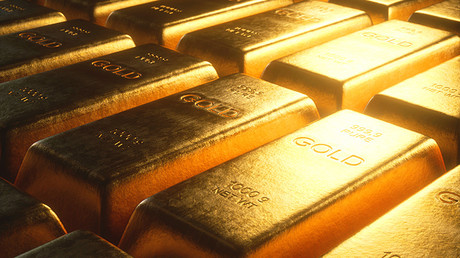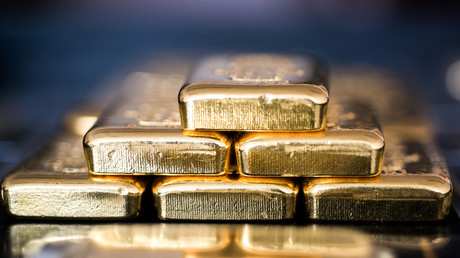East trusts in physical gold while West prefers 'mindless optimism' – Claudio Grass to RT

The latest data from the World Gold Council (WGC) shows that central banks in Eastern Europe and Asia significantly boosted their gold holdings. The regulators purchased 148 metric tons of gold in the third quarter of 2018.
The figure indicates an increase of 22 percent against the same period last year, while some $6 billion dollars were spent on the precious metal. Russia, Turkey, Kazakhstan, India, as well as Poland and Hungary were the leader among gold net buyers.
The reasons pushing Russia, Turkey and other countries facing US sanctions to buy more gold seem clear. But why are other countries bolstering their gold reserves and why do they find it necessary to diversify their holdings? RT talked to Claudio Grass, an independent precious metal advisory based out in Switzerland to find out why emerging economies are so active in stockpiling gold bullion.
RT: For years, Russia, China, India as well as many Asian countries have been stockpiling gold. More recently, countries like Poland and Hungary have begun to increase national gold reserves. What's behind the move?
Claudio Grass: Let’s look at the core motivation that drives anyone to become an owner of physical gold. Whoever buys physical precious metals, be it an institution, an individual or as we see now, central banks from different countries, largely have the same reasons for doing so: They all want to regain independence and sovereignty. This is achieved by decoupling from a financial system that is unsustainable, overstretched and founded on nothing but faith in government. As this faith is shaken and public trust corroded, it is wise for any individual or institution to own real goods directly themselves, rather than be another investor in paper bets and hope for the best. It is also useful to remember that many central banks are in the habit of publicly promoting one position but acting on another. While they might exude confidence in the economy and bask in what they promote as the success of their reckless monetary policies, they fully understand that gold is really one of the best reliable hedges in times of economic turmoil. That’s why we see this massive buildup of physical gold stocks. In other words, when it comes to taking one’s investing cues from institutional actors; it might be wise to follow to the old adage “Do as I do, not as I say”.
RT: It seems clear why Russia is increasing gold reserves, but why are countries in Eastern Europe like Hungary and Poland doing it?
CG: Besides the above mentioned main reasons, I hear from my trusted friends and partners in Poland that there is a sizable opposition among the people to the EU Migration policies, which is only set to grow in the future. Social division and political friction is likely to increase, which is always the case when you force people to accept and even pay for something they don’t want. The same goes for the people of Hungary. What I find interesting when talking to people in the East, is that having lived under communism until roughly 25 years ago, they now see the same signs emerging. Unlike many of us in the West, they still remember history and rightfully dread its repetition, so they oppose centralized power, especially when it’s coming from Brussels. They know that absolute power corrupts absolutely and all the devastation and human suffering that comes with it. Their central banks are not blind to the rising tensions with the EU and the grave risks of further escalation. Thus, their gold buying strategy sounds reasonable to me and in accordance with the wisdom of Pericles, who said “the key is not to predict the future, but to prepare for it.”
RT: Are these countries bracing for a potential currency crisis?
CG: Of course. It is impossible to create wealth out of nothing, and even though that is an eternal and universal truth, it hasn’t stopped states from trying to do exactly that. Unfortunately, if history teaches anything, it is that we don’t learn from it. Now we are stuck in a system that came 35 years ago and took us from 20 percent interest rates to zero and negative rates. We are sitting on a gigantic bubble in terms of illusionary financial “wealth”, at the end of a long-term debt cycle and the bill for the massive credit spending of the past decade is about to come in. Central planners can manipulate the markets and the economy only for so long before their actions lead to a predictable bust, and that pattern is becoming apparent to more and more people. As public faith in governments collapses, so will the value of their currency.
RT: Why aren't Western countries doing it? It seems they are only interested in gold-traded ETFs. Do they not believe in (physical) gold anymore?
CG: That’s simple: because people who don’t know history are doomed to repeat it. For some time, this system worked because America was able to prop up the world economy with USD-IOU’s. It worked as long as Americans continued to consume as much as possible with money they didn’t have and just print out of thin air. However, once the debt is so huge that they can’t keep up the illusion for much longer, it is the beginning of the end.
When it comes to building physical gold positions, I think complacency and overconfidence are the key markers of the western approach to the future at the moment. We see this is the markets too, in the blunt denial of warnings and cold facts in favor of extending the rally with wishful thinking. The same, arguably, applies when opting for paper gold over physical. Realism has lost over mindless optimism, placing the East at a significant advantage during the next economic crash.
RT: What are the dangers of not having significant gold reserves?
CG: Lord Rees-Mogg summarized it once as follows: “Governments lie; bankers lie; even auditors sometimes lie: gold tells the truth.” Therefore, people who buy gold understand that it is their personal insurance when the illusion fades and the trust in the current institutions crumbles. The prudent approach is to become your own central bank, by building up your own reserves in the form of a hard, tangible, real physical good that has no counter-party risk and has proved its reliability by serving as real money for 5000 years.






0 Comments:
Post a Comment
Subscribe to Post Comments [Atom]
<< Home